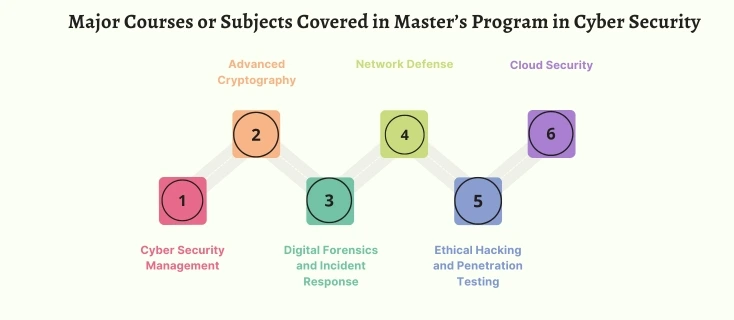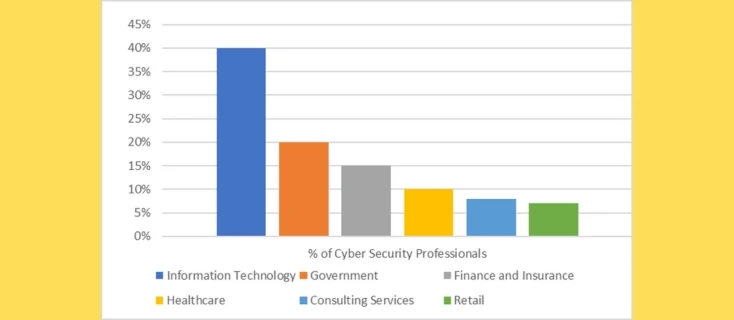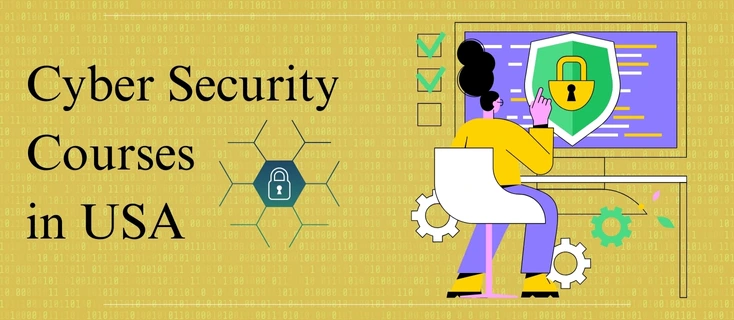Cyber Security is one of the most important fields in today’s digital world. As technology advances, so do the risks associated with it. Data breaches, hacking, and cyber threats are increasingly becoming prevalent, which makes the need for skilled cybersecurity professionals more urgent. The USA, being at the forefront of technology advancements, offers a wide range of cybersecurity courses that provide individuals with the knowledge and skills required to safeguard data, systems, and networks. This topic will walk you through the types of cyber security courses in USA, the best institutions offering these courses, career prospects, and the skills required to excel in this demand field.
Why Pursue Cyber Security Courses in USA
The USA is home to many of the world’s leading technology companies and universities, making it an ideal destination for cybersecurity studies. Here are some of the reasons why pursuing cyber security courses in the USA is a smart choice:
- American institutions are known for their state-of-the-art facilities and research in cyber security, providing students with hands-on experience and exposure to the latest tools and techniques.
- Cyber security is one of the largest professions within the USA. According to the US Bureau of Labor Statistics, the employment of information security analysts is projected to grow 35 percent from 2021 to 2031, much faster than for most other occupations.
- The best universities in the USA offer full cyber security programs ranging from undergraduate degrees to specific certifications and master’s courses, so that students gain a proper education and applicable experience.
- Universities in America are recognized across the globe for producing the most knowledgeable and skilled graduates. A course completed from any renowned institution can boost one’s career significantly across the globe.
Types of Cyber Security Courses in the USA
The USA offers different types of cyber security programs to cater to the different goals and educational backgrounds of the individuals. These include undergraduate degrees, master’s degrees, certificates, and online courses. Below are the most common types of cybersecurity courses in USA:
1. Undergraduate Programs in Cyber Security
For those who want to get directly into the cyber security field after completing high school, undergraduate courses provide a good grounding in information technology, network security, and data protection. These courses typically last 3-4 years and can be taken as a Bachelor of Science (BS) or Bachelor of Arts (BA) degree.

Major Courses Covered:
- Introduction to Cyber Security
- Network Security
- Cryptography
- Ethical Hacking
- Malware Analysis
- Digital Forensics
- Computer Programming
Best Universities for Undergraduate Degrees:
Here are the top universities for undergraduate programs in cyber security in USA
| University Name | Program Offered | QS World Ranking (2024) |
| University of Maryland, College Park | Bachelor of Science in Cyber Security | #169 |
| University of Texas at San Antonio (UTSA) | Bachelor of Business Administration in Cyber Security | #751 – 800 |
| Purdue University, West Lafayette | Bachelor of Science in Cyber Security | #93 |
| George Mason University | Bachelor of Science in Cybersecurity Engineering | # 1000 – 1200 |
| University of Texas, Dallas | Bachelor of Science in Computer Science with Cybersecurity Track | #521 – 530 |
| Drexel University | Bachelor of Science in Computing and Security Technology | #651 – 700 |
| John Hopkins University | Bachelor of Science in Cyber Security | #24 |
2. Master’s Programs in Cyber Security
A Master’s in Cyber Security provides advanced skills and knowledge in protecting digital infrastructure. The degrees usually take 1 to 2 years to complete with a more in-depth mastery of topics such as Advanced Cryptography, Risk management, and Ethical Hacking. A master’s course is suitable for those aspiring to leadership positions or a specialization in specific areas in cyber security.

Key Subjects Covered:
- Cyber Security Management
- Advanced Cryptography
- Digital Forensics and Incident Response
- Network Defense
- Ethical Hacking and Penetration Testing
- Cloud Security
Best Universities for Masters in Cyber Security in USA
Here are the top universities looking for Master in Cyber Security Courses in USA:
| University | Program Offered | QS World Ranking (2024) |
| Carnegie Mellon University | Master of Science in Information Security | #52 |
| Standford University | Master of Science in Cybersecurity | #3 |
| Massachusetts Institute of Technology (MIT) | Master’s in Cyber Security and Policy | #1 |
| University of California, Berkeley | Master of Information and Cybersecurity (MICS) | #10 |
| Georgia Institute of Technology (Georgia Tech) | Master of Science in Cybersecurity | #80 |
| John Hopkins University | Master of Science in Cybersecurity | #24 |
| New York University (NYU) | Master of Science in Cybersecurity | #39 |
| University of Texas at Dallas | Master of Science in Cybersecurity | #521-530 |
| Northeastern University | Master of Science in Cybersecurity | #300 |
Related Post: Best states in USA for International Students
3. Cyber Security Certification Programs
The best certification programs for those seeking to expand their knowledge in a specific area of cyber security courses in USA. These usually take a few months to complete and offer practical knowledge of security technologies, tools, and techniques. Certification programs are highly valued by employers and can be a good entry point to the cyber security field or expand one’s existing skillset.
Common Cyber Security Certifications:
- Certified Information Systems Security Professional (CISSP): A worldwide recognized certification, which has a broad scope of topics in cyber security.
- Certified Ethical Hacker (CEH): Focuses on the ethical hacking techniques used to identify and correct vulnerabilities in systems.
- Certified Information Security Manager (CISM): A certification that focuses on managing and assessing an organization’s information security program.
- CompTIA Security+: A certification at the entry level that provides knowledge on the basics of network security and risk management.
Top Colleges Offering Certification Programs:
- MIT Open Learning: Offers a Cyber Security Certification Program, which is an online course that provides practical skills in security operations.
- University of California, Berkeley Extension: Offers professional certificate programs in cyber security for those looking to enter or advance in the field.
- SANS Institute: Provides a range of excellent cyber security certifications including GIAC Security Essentials (GSEC) and GIAC Certified Incident Handler (GCIH).
Eligibility Requirements for Cyber Security Courses in USA
Different types of courses have varying eligibility criteria, but here are some general requirements:
| Criteria | Bachelor’s Program | Master’s Program |
| Academic Qualification | High school diploma or equivalent | Bachelor’s Degree in Computer Science, IT or a related field |
| GPA/Percentage | Minimum GPA: 2.5–3.0 (C+ to B grade) / 70–85% | Minimum GPA: 3.0–3.5 / 75–90% |
| Core Subjects | Strong grades in mathematics, physics, and computer sciences | Academic background in computer science and mathematics. |
| Test Score | SAT: 1200+ (recommended)ACT: 25+ (recommended) | GRE: 300+ (quantitative 155+ preferred)GMAT: 600+ (varies by institution) |
| English Proficiency | TOEFL: 80–100IELTS: 6.5–7.0 | TOEFL: 90–100IELTS: 7.0+ |
| Professional Experience | Not Required | Preferred but not mandatory for candidates with IT or cybersecurity work experience |
| Documents Required | High school transcripts Standardized test scores (SAT/ACT)English proficiency test scores Statement of Purpose | Undergraduate transcripts SOP Letters of Recommendation (LORs)Resume English proficiency test scores |
| Visa Requirement | Valid passportI-20 form from universityF-1 student visa SEVIS fee receipt Financial proof (bank statement) | Same |
| Timeline for Application | 8 – 12 months prior to the program’s start | 6 – 8 months prior to the program’s start |
What to Expect from a Cyber Security Program
Cyber security courses in USA offer an all-around education aimed at preparing students for an evolving world of digital threats. This includes the theoretical aspects, and practical skills, including but not limited to the following:
- Security Fundamentals: Students learn about the fundamentals of securing information systems.
- Ethical Hacking and Penetration Testing: A chance to test systems for vulnerabilities, which is essential for an accurate evaluation of system security.
- Incident Response: Cyber incidents such as data breaches or attacks which involve preparation and management for the said incident.
- Cryptology: This is the comprehension of using encryption to preserve data.
- Compliance and Regulations: Learning about safety standards and regulations such as GDPR, HIPAA, or PCI DSS.
Skills Acquired in Cyber Security Programs
By the end of a cyber security course, graduates should have been equipped with so many skills necessary for the protection of digital systems and networks. These range from the following:
- Technical Skills: Familiarity with firewalls, intrusion detection systems, encryption, and anti-malware tools.
- Problem-Solving Skills: The ability to identify vulnerabilities and come up with solutions to mitigate risks.
- Analytical Skills: The ability to analyze complex security threats and assess the effectiveness of security measures.
- Knowledge of Security Protocols: Understanding security protocols like HTTPS, SSL/TLS, and IPSec.
- Incident Management: Skills in responding to and managing security incidents.
Top Countries by CyberCrime Rates

Cybercrimes vary across the globe based on internet penetration, cybersecurity measures, and digital awareness. Below are some of the countries where cybercrimes are significantly prevalent:
| Country | Reported Cybercrime Cases (2023) | Estimate Annual Cost of Cyber Crime (USD) |
| United States | 791,790 | $10.5 Billion |
| India | 52,974 | $2.7 Billion |
| United Kingdom | 420,000 | $4.1 Billion |
| Germany | 124,000 | $5.1 Billion |
| China | 170,000 | $13.4 Billion |
| Russia | 80,000 | $4.3 Billion |
| Australia | 76,000 | $3.1 Billion |
| Canada | 70,317 | $3.5 Billion |
| Brazil | 150,000 | $1.9 Billion |
| South Africa | 54,000 | $0.6 Billion |
Career Opportunities in Cyber Security
The demand for cyber security professionals is on the rise, and the USA is home to many job opportunities in this field. Some of the most common job roles for cybersecurity graduates include:
- Information Security Analyst: This protects an organization’s computer networks and systems.
- Ethical Hacker: This conducts penetration tests to identify vulnerabilities in systems.
- Network Security Engineer: This designs and implements secure networks for organizations.
- Cyber Security Consultant: Guide organizations about how they need to secure their systems and data against cyber attacks.
- Cyber Security Architect: Designs the security infrastructure of any organization.
- Incident Responder: Manages the impact and mitigation of the cyber attack.
- Chief Information Security Officer: Heads all types of cyber security strategy an organization develops.
Cyber Security Salary Expectations
Cybersecurity professionals are highly demanded, and the salary figures reflect this. The average salaries for some common cyber security roles in the USA are as follows:
| Job Role | Salary per year |
| Information Security Analyst | $95,000 per year |
| Incident Responder | $88,000 per year |
| Ethical Hacker | $100,000 per year |
| Network Security Engineer | $98,000 per year |
| Security Architect | $120,000 per year |
| Cyber Security Consultant | $105,000 per year |
| CISO | $150,000 per year |
Top Industries for Cyber Security Professionals

Cybersecurity graduates can find opportunities in a wide range of sectors after completing any bachelor or master cyber security courses in USA, including:
- Technology: Defense of IT infrastructures and developing security software and networking.
- Banking and Finance: Securities for transactions and fraud prevention.
- Healthcare: Patient’s data security and compliance to privacy laws such as HIPAA.
- Government: Protection of national interests with government agencies such as the FBI, NSA, or DoD.
- Retail and E-commerce: Protection of online stores from cyber attacks and customer data.
| Industry | % of Cyber Security Professionals |
| Information Technology | 40% |
| Government | 20% |
| Finance and Insurance | 15% |
| Healthcare | 10% |
| Consulting Services | 8% |
| Retail | 7% |
Top Companies Hiring Cyber Security Professionals
- IBM
- Cisco
- Microsoft
- FireEye
- Amazon Web Services (AWS)
- Palo Alto Networks
- CrowdStrike
- Lockheed Martin
- Northrop Grumman
- Raytheon Technologies
- Deloitte
- Accenture
- Apple
Cyber Security in the Job Market
Cyber security is not a job. It is a need of the age of digitalization. As stated by (ISC)², the global shortage of cyber security professionals hovers at more than 3 million, with the USA facing an alarming shortage of cyber security professionals. Hence, it leaves much potential for a highly demanded position with a very handsome paycheck.
In Demand Skills
- Penetration Testing
- Incident Response
- Threat Intelligence
- Compliance Management
- Risk Assessment
Prospects for Future:
With advancements in 5G, IoT, and AI, the demand for cybersecurity experts will only increase. By equipping themselves with cutting-edge skills, cyber security professionals can expect long-term career stability and growth.
Conclusion
Cyber security courses in USA offer a broad portfolio of programs for anyone willing to pursue a career in this high-demand area of expertise. With the USA combining cutting-edge technology with excellent universities and promising careers, it is one of the best places to study cyber security. Whether you are at the beginning of your educational journey or you want to move forward in your profession, there is much you can learn to achieve success in cyber security.
Related Post
Duolingo Accepting Universities in USA
Best States in USA for International Students
Digital Marketing Courses in USA
Best Animation Colleges in World













